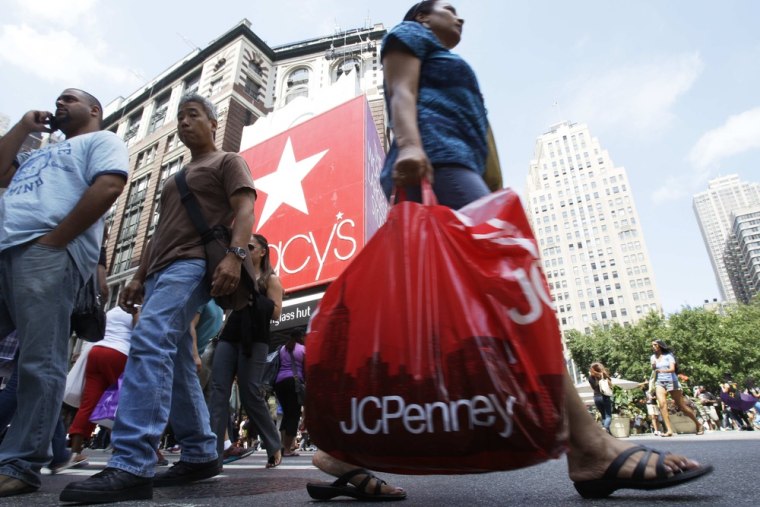Consumer sentiment dropped to its lowest point in more than three decades in early August, a survey showed Friday, even as a separate report showed that consumer spending jumped sharply in July.
The mixed signals appear to reflect the sudden, sharp downturn in consumer and market sentiment that took hold in late July and early August as Americans watched a bitter battle play out in Congress, bringing the Treasury within hours of a potential default.
The Thomson Reuters/University of Michigan's index on consumer sentiment came in at the lowest level since May 1980, and the performance of politicians in Washington was clearly on the mind of survey respondents.
"Never before in the history of the surveys have so many consumers spontaneously mentioned negative aspects of the government's role," survey director Richard Curtin said in a statement.
The preliminary August reading on the index, at 54.9, was the lowest since May 1980 and down from 63.7 in July. It was well below the the median forecast of 63.0 among economists polled by Reuters.
The consumer sentiment number barely slowed a rally on Wall Street, where stock prices have been swinging wildly for more than a week. The Dow Jones industrial average was up nearly 150 points at late trading after a brief sell-off after the consumer sentiment report was published.
Trading was buoyed by a government report showing that retail sales rose 0.5 percent last month, the best showing since March, as consumers spent more on autos, furniture, clothing and gas.
Even after excluding sales at gas stations, which were influenced by an increase in gas prices, sales rose 0.3 percent last month.
The government also revised sales higher in the previous two months.
Mark Vitner, senior economist at Wells Fargo Securities, said the retails sales number reduces the likelihood of another, "double dip" recession.
"Today’s report is a welcome development that allays concerns about a double-dip recession," he said in a note. ""The U.S. consumer has proven to be remarkably resilient."
The report was the government's first read on consumer spending for the July-September quarter. Consumer spending is always closely watched because it accounts for 70 percent of economic growth. But in June, consumers cut spending for the first time in 20 months, a troubling sign.
Troy Davig, a senior economist with Barclays Capital, said the report on consumer sentiment raises concern about future spending, but he also pointed out that the recent drop in oil prices should help.
"The report suggests that households are concerned about how the debt-ceiling agreement was concluded and the ability of policymakers to implement effective economic policy," he said.
Goldman Sachs said the retail sales report was a bit better than expected and consistent with its forecast for slow growth of about 2 percent in the current quarter.
Retail sales, which don't include spending on services, have been slowing since February as the economy has failed to add jobs and growth has sputtered.
President Barack Obama was expected to meet Friday afternoon with chief executives from Johnson & Johnson, Wells Fargo & Co, US Bank, and other companies, Reuters reported. White House spokesman Josh Earnest said Obama was constantly "on the hunt" for new job creation ideas and that would be on the agenda for the CEO meeting.
The consumer sentiment survey, taken before the Aug. 5 downgrade of U.S. sovereign debt by Standard & Poor's, showed the gauge of consumer expectations slipped to 45.7, also the lowest since May of 1980, from July's 56.0 and below a predicted reading of 55.3.
The Obama administration received poor ratings from 61 percent of respondents, the worst showing among all prior heads of state.
"This was more than the simple recognition that traditional monetary and fiscal policy measures were largely spent; it was the realization that the government was unable or unwilling to act," Curtin said.
Two-thirds of all consumers reported that the economy had recently worsened, and just one-in-five anticipated any gains during the year ahead.
Bad times in the economy were expected by 75 percent of all consumers in early August, just below the all-time peak of 82 percent in 1980.
The survey's barometer of current economic conditions was 69.3 in August, down versus 75.8 in July and below a forecast of 74.3.
A batch of poor data and a gloomy outlook from the Federal Reserve this week have made investors more nervous that the economy could fall back into a recession. The Dow has lost nearly 1,600 points, or more than 12 percent, since July 22.
Many economists, including Federal Reserve Chairman Ben Bernanke, had thought the economic slowdown was mostly because of temporary factors, such as high gas prices and the parts shortage out of Japan.
But this week the Fed acknowledged that the economy's problems are deeper. Its statement suggested growth could be dismal for at least two more years.
As a result, the Fed took the unprecedented step of pledging to keep a key interest rate it controls at a record low near zero at least through mid-2013.
